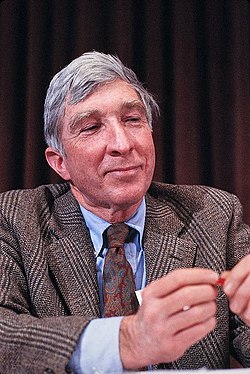John Updike Quote
Writing … is an addiction, an illusory release, a presumptuous taming of reality, a way of expressing lightly the unbearable. That we age and leave behind this litter of dead, unrecoverable selves is both unbearable and the commonest thing in the world — it happens to everybody. In the morning light one can write breezily, without the slight acceleration of one’s pulse, about what one cannot contemplate in the dark without turning in panic to God. In the dark one truly feels that immense sliding, that turning of the vast earth into darkness and eternal cold, taking with it all the furniture and scenery, and the bright distractions and warm touches, of our lives. Even the barest earthly facts are unbearably heavy, weighted as they are with our personal death. Writing, in making the world light — in codifying, distorting, prettifying, verbalizing it — approaches blasphemy.
Writing … is an addiction, an illusory release, a presumptuous taming of reality, a way of expressing lightly the unbearable. That we age and leave behind this litter of dead, unrecoverable selves is both unbearable and the commonest thing in the world — it happens to everybody. In the morning light one can write breezily, without the slight acceleration of one’s pulse, about what one cannot contemplate in the dark without turning in panic to God. In the dark one truly feels that immense sliding, that turning of the vast earth into darkness and eternal cold, taking with it all the furniture and scenery, and the bright distractions and warm touches, of our lives. Even the barest earthly facts are unbearably heavy, weighted as they are with our personal death. Writing, in making the world light — in codifying, distorting, prettifying, verbalizing it — approaches blasphemy.
Related Quotes
About John Updike
Hundreds of his stories, reviews, and poems appeared in The New Yorker starting in 1954. He also wrote regularly for The New York Review of Books. His most famous work is his "Rabbit" series (the novels Rabbit, Run; Rabbit Redux; Rabbit Is Rich; Rabbit at Rest; and the novella Rabbit Remembered), which chronicles the life of the middle-class everyman Harry "Rabbit" Angstrom over the course of several decades, from young adulthood to death. Both Rabbit Is Rich (1981) and Rabbit at Rest (1990) were awarded the Pulitzer Prize.
Describing his subject as "the American small town, Protestant middle class", critics recognized his careful craftsmanship, his unique prose style, and his prolific output – a book a year on average. Updike populated his fiction with characters who "frequently experience personal turmoil and must respond to crises relating to religion, family obligations, and marital infidelity".
His fiction is distinguished by its attention to the concerns, passions, and suffering of average Americans, its emphasis on Christian theology, and its preoccupation with sexuality and sensual detail. His work has attracted significant critical attention and praise, and he is widely considered one of the great American writers of his time. Updike's highly distinctive prose style features a rich, unusual, sometimes arcane vocabulary as conveyed through the eyes of "a wry, intelligent authorial voice that describes the physical world extravagantly while remaining squarely in the realist tradition". He described his style as an attempt "to give the mundane its beautiful due".
